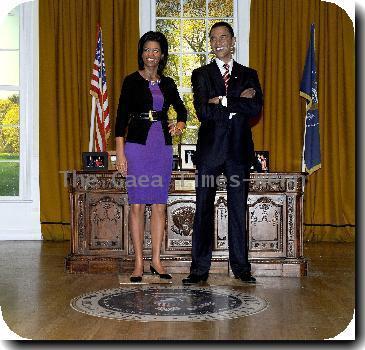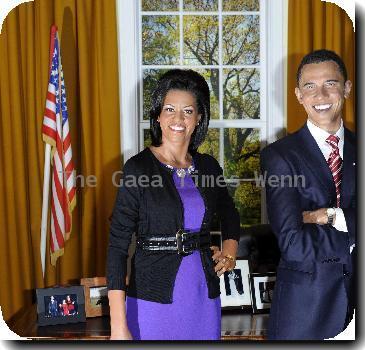Uranium-mining nations flout UN on atomic terror, as Obama readies nuclear security summit
By Charles J. Hanley, APSaturday, April 3, 2010
Uranium-mining nations flout UN on nuclear terror
NEW YORK — Years after a six-month deadline passed, dozens of nations, including uranium producers, remain potential weak links in the global defense against nuclear terrorism, ignoring a U.N. mandate on laws and controls to foil this ultimate threat.
Niger, a major uranium exporter, and the Democratic Republic of the Congo, the source of the uranium for the first atomic bomb, are among the states falling short in complying with Security Council Resolution 1540, a key tool in efforts to block nuclear proliferation.
Uncontrolled freelance mining in the Congo has long worried international authorities that the raw material for a bomb might fall into the wrong hands.
U.S. President Barack Obama, who calls nuclear terrorism “the most immediate and extreme threat to global security,” hosts a summit on nuclear security April 12-13 in Washington, where implementation of Resolution 1540 will be high on the agenda.
Twenty-nine nations have failed to report they have taken action on nuclear security as required by the 2004 resolution. Among the more than 160 governments that have reported, the information supplied is often sketchy.
Resolution 1540, which set a reporting deadline of October 2004, “imposes strict reporting requirements on states, but few have fully met them,” the International Commission on Nonproliferation and Nuclear Disarmament, a prestigious study group, concluded in its final report last December.
Mexican U.N. Ambassador Claude Heller, chairman of the U.N. committee monitoring 1540’s implementation, said he plans a series of meetings with noncompliant states to urge cooperation, and he sees Obama’s summit as a chance to “send a strong message” about the U.N. mandate’s importance.
“It is a legally binding regime that was adopted by the Security Council,” Heller told The Associated Press. “It is not up to governments to say yes we will report or not.”
Resolution 1540, promoted by the U.S. in the aftermath of the 9/11 terror attacks and the 2004 uncovering of the Pakistan-based A.Q. Khan nuclear smuggling network, is the only global legal instrument designed to disrupt links between terrorists and nuclear technology. Unlike treaties, applicable only to states that ratify them, this U.N. mandate obligated all nations.
It required governments to “adopt and enforce appropriate effective laws which prohibit any non-State actor,” such as terrorists, from making or possessing nuclear, chemical or biological weapons, their delivery systems or related material. Governments must establish “effective” border and export controls and physical protection for sensitive materials and sites.
An AP review of filings found vast differences in national reporting.
The U.S. and other industrialized nations filed reports of up to 30,000 words detailing relevant laws and how they are enforced, while other, smaller countries submitted reports of just a few hundred words noting — irrelevantly — the nonproliferation treaties to which they subscribe or, in Uganda’s case, requesting financial aid to carry out 1540’s obligations.
In its own review issued in January, Heller’s committee cited major gaps in reporting on whether activities related to weapons of mass destruction were criminalized, on whether laws are enforced, on establishing lists of controlled items, and on restricting access to sensitive materials.
Almost all the non-reporting states are in Africa, including uranium producers Zambia, Malawi and the Central African Republic.
Niger and the Democratic Republic of the Congo, which as the Belgian Congo colony produced the uranium that fueled the U.S. weapon dropped on Hiroshima, Japan, in 1945, didn’t file reports for four years after the resolution’s adoption. In 2008, the 1540 committee’s expert staff drafted reports on behalf of those two countries, drawing on publicly available information. But Niger and Congo themselves have not reported taking steps to tighten nuclear security under 1540.
The “Hiroshima mine” at Shinkolobwe in southern Congo was closed in 1960, but in recent years thousands of individual miners, officially unsanctioned, have worked at the site, extracting cobalt and, some reports say, uranium.
The International Atomic Energy Agency (IAEA), the U.N. nuclear watchdog, has expressed concern about poor security at the mine, as well as at a nuclear research reactor in Kinshasa, the Congolese capital, whose spent uranium fuel could be used for a terrorist’s radioactive “dirty bomb.”
Niger, in central Africa, has huge reserves of the continent’s highest-grade uranium. In some years it ranks as the world’s No. 3 producer.
With renewed global interest in nuclear power, mining companies are stepping up uranium exploration and development in Niger and elsewhere in Africa, including in Gabon, Guinea, Mali and Mauritania, all non-filers under Resolution 1540.
Although they might manage to fashion relatively simple “dirty bombs,” al-Qaida and other terror groups wouldn’t have the expertise or large infrastructure needed to build nuclear weapons from raw African uranium. Experts fear, however, that “non-state actors,” including financially motivated smugglers, might deliver ore, technology or other material to a state with an illicit weapons program.
Iran, which denies Western allegations its nuclear power program is meant for weapons-building, is known to need more foreign uranium supplies.
Resolution 1540 reporting “is important especially for countries that have uranium mines or an old research reactor,” said Swedish nonproliferation scholar Johan Bergenas.
By reviewing their laws and practices for the U.N., countries can detect weaknesses and remedy them with help being offered by the U.S. and other developed nations, said Bergenas, a researcher at the Washington office of the Monterey Institute of International Studies.
Heller, Bergenas and others familiar with the process say poor African states are choosing to devote their limited resources to higher priorities than U.S. and European concerns about nuclear proliferation. A Niger U.N. diplomat seemed to agree.
“We lack capacity to follow all such requirements,” said Boubecar Boureima. In tracking Security Council developments, he said, “we deal with economic matters, peacebuilding in our region and other matters of interest to us.
“We have uranium,” he added, “but we have no intention to go the wrong way.”
The 1540 regime’s weaknesses lie not only at the reporting end, but here at the U.N. as well, diplomats say.
Ambassador Jorge Urbina of Costa Rica, Heller’s predecessor as committee chairman, said more expert staffing is needed to better monitor how nations comply with 1540. He and Heller also believe the U.N. should consider establishing a permanent agency to oversee 1540, to replace the committee, made up of an ever-changing lineup of 15 Security Council member countries.
“You don’t need 15 countries deciding on every move,” Urbina said. “The committee process has slowed implementation.”
An IAEA database counts scores of thefts, losses and other incidents involving nuclear materials each year. “It shows there’s a risk that the international community has to deal with,” Heller said. His committee pledges to “redouble its efforts.”
“It is still a very young regime,” the Mexican diplomat said of Resolution 1540. “It is one thing to adopt something. The second challenge is to implement it.”
Tags: Africa, Barack Obama, Central Africa, Democratic Republic Of Congo, International Agreements, National Security, New York, Niger, North America, Nuclear Weapons, Political Issues, Terrorism, United States, Weapons Administration, Weapons Of Mass Destruction, West Africa



